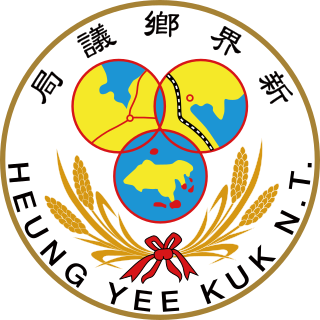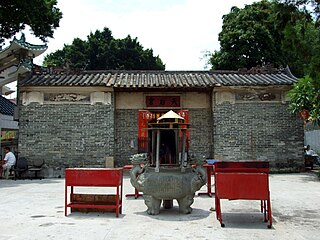Related Research Articles

Cheung Chau is an outlying island of Hong Kong, located 10 km (6.2 mi) southwest of Hong Kong Island. It is also called Dumbbell Island due to its dumbbell-like shape. It has been inhabited for longer than most other places in Hong Kong, and had a population of 22,740 as of 2011. Administratively, it is part of the Islands District.

The Heung Yee Kuk, officially the Heung Yee Kuk N.T., is a statutory advisory body representing establishment interests in the New Territories, Hong Kong. The council is a powerful organisation comprising heads of rural committees which represent villages and market towns.

Elections in Hong Kong take place when certain political offices in the government need to be filled. Hong Kong has a multi-party system, with numerous parties in the Legislative Council. The Chief Executive of Hong Kong is nonpartisan but can work with several parties to form a coalition government.

Kuk Po is an area situated in the north eastern New Territories of Hong Kong, to the south of the Starling Inlet, opposite the town of Sha Tau Kok.
Rural committees are bodies representing the welfare of indigenous residents in the New Territories of Hong Kong. The chairman of each rural committee is the representative in the Heung Yee Kuk, and is ex officio member of a district council.

The New Territories West geographical constituency was one of the geographical constituencies in the Legislative Council of Hong Kong from 1998 to 2021. It was established in 1998 for the first SAR Legislative Council election and was abolished under the 2021 overhaul of the Hong Kong electoral system. Located in the western part of the New Territories, it was the largest geographical constituency in Hong Kong with 1,308,081 electorates in 2020. It consisted of Tsuen Wan District, Kwai Tsing District, Tuen Mun District, Yuen Long District and Islands District. In the 2016 Legislative Council election, it elected nine members of the Legislative Council using the Hare quota of party-list proportional representation.

Lau Wong-fat, GBM, GBS, OBE, JP was a Hong Kong businessman and politician. He had been the long-time chairman of the Rural Council, the most powerful organ representing the interests of the New Territories indigenous inhabitants from 1980 to 2015. He was also a member of the Legislative Council of Hong Kong from 1985 to 2016. From 2009 to 2012 he was a non-official member of the Executive Council of Hong Kong. He had also served as the member of the Chinese People's Political Consultative Conference and chairman of the Regional Council and the Tuen Mun District Council.
San Shek Wan is a small village located on Lantau Island, Hong Kong.

Kwu Tung is an area in the northern New Territories, west of Sheung Shui and Fanling, and east of Lok Ma Chau and San Tin, in Hong Kong.

Christian Zheng Sheng College is a private school in Hong Kong established by the Christian Zheng Sheng Association (ZSA). Its founder and principal is Chan Siu Cheuk. The school aims to correct problematic students with drug addiction and other problems using life education.

The Tuen Mun Rural Committee is a rural committee in Hong Kong. It was founded by rural leader Chan Yat-sen in 1953 with representatives from 29 villages in Tuen Mun. Today the rural committee consisted of 36 villages and 69 village representatives.

Kenneth Lau Ip-keung is a New Territories rural leader in Hong Kong. He is the current chairman of the Heung Yee Kuk and member of the Legislative Council of Hong Kong for the Heung Yee Kuk functional constituency, succeeding his father Lau Wong-fat in 2015 and 2016 respectively. He has been an unofficial member of the Executive Council of Hong Kong since 2017. He was awarded the Bronze Bauhinia Star by the Hong Kong SAR Government in 2017.

Ping onbun is a traditional Hong Kong food. It is a steamed bun consisting of low-protein rice flour and sugar, with a filling of either lotus seed paste, sesame, or sweet bean paste, that is then stamped with Chinese text reading "peace" or "safety". It is best served hot or at room temperature.

Bowie Hau Chi-keung is a rural leader and businessman in Hong Kong. He is the current chairman of the Sheung Shui Rural Committee, ex officio executive committee member of the Heung Yee Kuk and ex officio member of the North District Council.
The Wang Chau housing controversy comprises a series of events related to a housing project in Wang Chau, Yuen Long District, Hong Kong. Initiated in 2012, the housing project aims to develop 17,000 public housing units in three phases. Phase 1 refers to ongoing development of 4,000 units in a "green-belt" site; while phases 2 and 3 refer to the deferred plan to build the rest of the targeted units in the "brownfield" site. The case came under media scrutiny after activist Eddie Chu Hoi-dick raised concerns about potential collusion between the Hong Kong government, businesses and rural landlords in his election campaign.

Cheung Chau is one of the 10 constituencies in the Islands District.

Fung Chi Tsuen is a village in Wang Chau, Yuen Long District, Hong Kong.
2019 Hong Kong Rural Representative election was held in January 2019 to elect 1,540 Rural Representatives in the New Territories of Hong Kong. This is the first time pro-democracy camp formed electoral alliance to run in the rural election, despite co-initiator Eddie Chu was disqualified and the alliance failed to gain any seats.
References
- 1 2 3 "Report on the 2003 Village Representative Election" (PDF). Electoral Affairs Commission.
- 1 2 3 "Background". Home Affairs Department.
- ↑ "Types of Rural Representatives and their Functions". Home Affairs Department.
- ↑ "Breakdown of Number of Villages and Village Representatives By District" (PDF). Election Affairs Commission.
- ↑ "Breakdown of Number of Villages and Village Representatives By District" (PDF). Election Affairs Commission.
- ↑ "Breakdown of Number of Villages and Village Representatives By District" (PDF). Election Affairs Commission.
- ↑ "Breakdown of Number of Rural Areas and Rural Representatives By District" (PDF). Election Affairs Commission.
- ↑ "Breakdown of Number of Rural Areas and Rural Representatives By District" (PDF). Election Affairs Commission.
- ↑ Wong, Michael (2015-01-29). "長洲改革派挑戰選舉失敗". Harbour Times. Retrieved 2023-03-20.
- ↑ "【Emily】長洲街坊代表選舉 投票率跌12百分點 - 20230116 - 港聞". 明報新聞網 - 每日明報 daily news (in Traditional Chinese). Retrieved 2023-03-20.